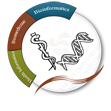Topics covered by HI-BI-BI 2013 include but are not limited to work in progress as well as cutting-edge and novel findings on the latest trends and developments in health informatics, encompassing areas such as:
- Clinical and hospital human resource management and performance analysis.
- Computer aided diagnosis.
- Computational biomedicine, genomics, proteomics, transcriptomics, metabolimics, sociogenomics.
- Controlled and optimized utilization of resourc.
- Data analysis and disease biomarker prediction.
- Data mining and machine learning techniques in health informatics.
- Drug design, disease diagnosis and control.
- E-health and web-based information services.
- Evaluation and use of information technology in healthcare
- Healthcare applications of mobile and pervasive technologies.
- Human-computer interaction.
- Future developments in technologies and applications.
- Intelligent Health Information Systems & Decision Support Systems.
- Integration and sharing of heterogeneous health information systems.
- Integration and sharing of heterogeneous health data sources.
- Information and image retrieval.
- Language parsing methods in biomedicine.
- Modelling, simulation and evaluation of healthcare services
- Mobile solutions for sharing information in healthcare services
- Patient tracking and monitoring: spatio-temporal models
- Privacy protection and data security in health informatics systems.
- Process management and collaborative work.
- Reuse in Health Information System development and maintenance.
- Signal processing and streaming databases.
- Spread and control of epidemics.
- Social network modelling and analysis in health informatics.
- User interfaces and visualization for health informatics systems.
For more information download the CFP document.


